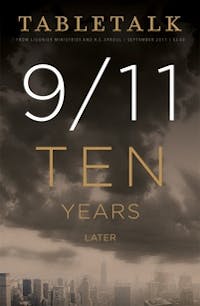
Request your free, three-month trial to Tabletalk magazine. You’ll receive the print issue monthly and gain immediate digital access to decades of archives. This trial is risk-free. No credit card required.
Try Tabletalk NowAlready receive Tabletalk magazine every month?
Verify your email address to gain unlimited access.
I love the Lord of the Rings. I remember sitting in a hotel room in Seattle, Washington, in December of 2003, reading the last book of the trilogy, The Return of the King. I had just spent the previous few days in New York City at the invitation of a friend, and I was considering whether or not God might be leading us to start a church there. I left New York hopeful that I would never move there.
To be honest, there was a lot of fear in my heart about the city. It was overwhelmingly large, seemed like a challenging place to raise a family, and was not known to be a place where a new church could become a sustained presence. The events of 9/11 had created a culture of fear and had given new life to the anxieties of our own vulnerability. I recoiled at the thought of moving my family to a city that lived under the steady threat of attacks. Honestly, my lack of interest in the city was more about those personal fears than about the city itself or God’s intentions for us. So, we found ourselves in Seattle considering whether the Northeast might be the place God would have us move to begin a work.
As I was reading Tolkien, I came to a dialogue between Aragorn, the heir of Gondor, and Eowyn, a noblewoman of Rohan. Eowyn is pleading to join Aragorn on a dangerous journey. After Eowyn says she fears neither death nor pain, Aragorn asks what she does fear, and Eowyn replies with a profound statement:
A cage. To stay behind bars until use and old age accept them and all chance of valor has gone beyond recall or desire.
At that moment in that hotel room, I sensed God was saying something like this to me: “The longer you play it safe and avoid risk and the potential of loss, the more you will accept the present and lose your capacity to dream about and shape the future. When you give your fears more authority than the Spirit of God, all chance of God-exalting valor and generational impact is lost.” I resolved that morning not to make decisions based on sensitivity and submission to my fears but on sensitivity and submission to the Spirit.
From that moment, God clearly began to move our hearts to New York City. One year later, we were closing on an apartment on the Upper East Side of Manhattan and preparing for the most significant move of our lives. Since that time, we have come to realize that New York City is one of the greatest places on the planet, a wonderful place to raise a family, and, by God’s grace, Apostles Church has become a sustained presence in our city, seeking to renew all things with the message and mercy of Christ. That is much better than a cage.
The details of our personal stories are different, but when it comes to the issue of fear, we all face the same question. Will I choose to quench the Spirit by cowering under the tyranny of the what if: What if I fail? What if I suffer? What if I go without? If God is prompting you to cross the street and engage a neighbor or to cross the ocean and invest your life among an unreached people, will the what if paralyze you? If God is stirring your heart toward radical, future-shaping generosity, will the what if have the final say? Will you let an unsanctified imagination stir up potential scenarios that argue you out of obedience to the Scriptures and the Spirit’s promptings?
The good news is that the gospel invites us into the freedom, joy, and confidence of if God. When the volume on gospel realities is turned up, the fears of the what ifs are drowned out. God may call us to something that is challenging, risky, and maybe even potentially threatening. The tyranny of the what if is silenced when we hear the if God of the gospel: “If God is for us, who can be against us? He who did not spare his own Son but gave him up for us all, how will he not also with him graciously give us all things?” (Rom. 8:31–32).
When you sense God moving you toward radical generosity, the tyranny of the what if screams, “What if you don’t have enough for your own needs? What if an emergency happens and you need these funds later? What if…” But the Scriptures assure us that “if God so clothes the grass, which is alive in the field today, and tomorrow is thrown into the oven, how much more will he clothe you?” (Luke 12:28). What is winning out in your heart? The what if or the if God?
What do you fear? How have your fears robbed you of a chance to shape the future of another person, a neighborhood, a city, or even a nation? How many people have you forfeited the opportunity to bless because of your fears? If God is holy, sovereign, wise, good, powerful, and abounding in love, let us resolve to no longer ascribe greater authority to our fears than we do to God.
